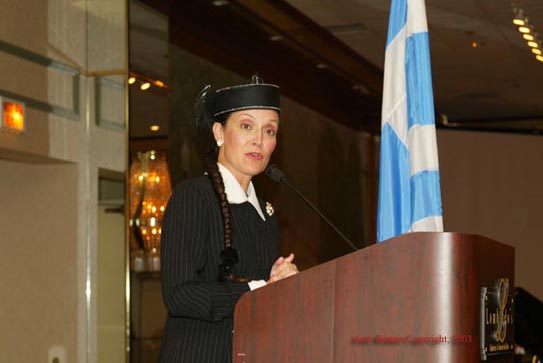
|
Photos (c) 2003 by Areti Bratsis
Doing is Leading: Leadership Qualities Inherent in All Faithful Metropolis of Boston 17th Annual Ministry Awards Randolph, Massachusetts June 8, 2003 Opening Remarks of Mary Papoutsy, Master of Ceremonies
|
|
|
Tonight we celebrate many things, but most of all, the remarkable service of people selected by peers to represent their community this evening. Each of the honorees has modeled, time and again, exemplary behavior for others, particularly the youth of our communities. And it is about these stellar examples that I would like to say a few words briefly as we commence our program. If someone were to say—as I happened to hear earlier this week—that there were two kinds of people in this world, leaders and doers, most people would readily agree. After all, we only need look around us or pick up a local newspaper to observe evidence which would tend to support this position. Even here tonight, we have one of the finest examples of leadership in His Eminence. It is through his vision, creativity, and foresight that our metropolis has prospered; among many other significant projects, we now have a metropolitan center in Brookline, the Philoxenia House, and a wonderful summer camp and spiritual retreat in New Hampshire. Such leadership has brought many a dream to fruition. And here tonight we have examples of people who are doers—in fact, many examples, most of them receiving awards. But how many of us would say that the qualities of leaders and doers could be found in the same person? Not many, I would say. Most of us grow up believing that leaders are people with legendary status, people like presidents and prime ministers, generals and admirals, astronauts and sports figures, firemen and policemen, patriarchs and saints, archbishops and metropolitans. And this impression is correct. But it is not complete. For the qualities which make a leader are inherent in each of us. To be sure, each of us does not have the very same abilities as a legendary statesman or hero; nevertheless, we do have the capacity to lead by setting examples. Every outstanding leader understands that he or she must demonstrate by modeling desired behavior in order to be effective. Let’s take the example of a teacher, one with which we can all identify. If our teacher were to arrive at the beginning to our appointed class time looking downcast and expressing reservations about our ability to master the targeted materials, we would probably not learn our lesson very well. Conversely, if our teacher told us that we were fine students and had every confidence that we would learnt he material in our books, liberally praising our efforts, our chances of mastering the materials would be greatly enhanced. Now, some of us might say, “Well, I’m not a teacher. What does teaching have to do with me?” And I would reply, “What does teaching have to do with you? Everything!” Every time one of us performs some task for our church community—although we may think of ourselves as doers and not as leaders—we model behavior for others. Without realizing it, we use some of the very same skills employed so successfully by recognized leaders. Just as the teacher who must set the tone and standards of accomplishment for a classroom of students, we, too, set the tone and standards for others in our church communities who observe our behavior. If each of our honorees this evening were to stop performing their many wonderful and indispensable deeds for our churches, we would be in serious trouble. If each of our honorees did not model optimism and a can-do attitude, we would find ourselves in even more difficulty. Each of our awardees, I submit, then, is also a leader—a leader by example. And just so, every member of our communities has the capacity to demonstrate some leadership qualities. And since we know that they have labored tirelessly over many years, we can state unhesitatingly that they have exerted an enormous influence upon the youth of our churches. Perhaps it is time for us to rethink the statement that there are two kinds of people in this world, leaders and doers. Perhaps we should say instead that we all have the capacity to be both leaders and doers. Perhaps we should pause a moment to recognize that leading IS doing and that doing is LEADING. These two actions are inextricably intertwined. Each of us leads in different ways through our actions and our words. Each of the leaders here this evening deserves great praise—and let me emphasize that again, great praise—praise for setting examples lovingly and steadfastly for all of us to follow. For each of you honored leaders who are receiving awards this evening, I say “Axios!”
|
Award-winning photographer Areti Bratsis of Foxboro, MA, is a graduate of the New England School of Photography and is a member of state, national and regional professsional associations. Visit her website at www.aretiphoto.com |
